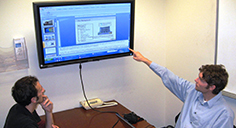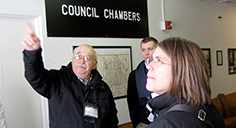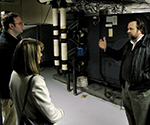Innovation
InnovationFord Grant Powers "Cities of Promise" Drive to Save Money, Boost Energy Efficiency
 Innovative ideas are needed to power solutions for tomorrow. Michigan's cities and towns are facing budget challenges on a daily basis and seeking creative ideas to ease the squeeze on community dollars. With Ford Motor Company's help, students at The Erb Institute for Global Sustainable Enterprise at the University of Michigan are helping create one solution for Michigan's poorest cities: an innovative financial model that will provide desperately needed capital to upgrade facilities, reduce energy consumption and save money.
Innovative ideas are needed to power solutions for tomorrow. Michigan's cities and towns are facing budget challenges on a daily basis and seeking creative ideas to ease the squeeze on community dollars. With Ford Motor Company's help, students at The Erb Institute for Global Sustainable Enterprise at the University of Michigan are helping create one solution for Michigan's poorest cities: an innovative financial model that will provide desperately needed capital to upgrade facilities, reduce energy consumption and save money.
The work is being fueled by a $50,000 grant from Ford Motor Company Fund. The funds will be used to implement a "revolving energy fund" (REF) for some of the state's "Cities of Promise," including the manufacturing centers of Flint, Pontiac and Saginaw.
 The REFs also will deploy $4.4 million in seed funding from the Michigan Public Services Commission as part of a larger program led by the Clean Energy Coalition, a Michigan nonprofit. This initial capital will fund energy efficient building upgrades in municipal buildings. As these upgrades decrease the cities' utility bills, the savings will be used to repay the REF. This will create a growing pool of capital that can be used to fund additional energy efficiency projects in the future.
The REFs also will deploy $4.4 million in seed funding from the Michigan Public Services Commission as part of a larger program led by the Clean Energy Coalition, a Michigan nonprofit. This initial capital will fund energy efficient building upgrades in municipal buildings. As these upgrades decrease the cities' utility bills, the savings will be used to repay the REF. This will create a growing pool of capital that can be used to fund additional energy efficiency projects in the future.
"This project provides not just a quick fix, but a sustainable solution to energy infrastructure challenges in some of Michigan's most disadvantaged communities," said Rick Bunch, managing director of The Erb Institute for Global Sustainable Enterprise. "The Erb Institute has collaborated with Ford on both a local and global level, from student internships to Advisory Board relationships, for years, and we deeply appreciate Ford's support on this important new initiative."
"We consider The Erb Institute to be a valuable partner in our efforts to keep Michigan's economy strong while delivering on our commitment to social and environmental sustainability around the world," said Mike Schmidt, director, education and community development, Ford Motor Company Fund. "With this grant, our intent is to help Michigan communities better utilize energy management and conservation tools to reduce their energy costs."
REFs are an innovative, but well-proven approach to the challenge of generating capital for energy efficiency and upgrade projects at cash-strapped municipalities across the country. Cities from Ann Arbor to Portland, Oregon and Phoenix, Arizona have successfully used REFs to support these programs and have seen energy savings in excess of program costs.
 The grant from Ford is part of the Ford College Community Challenge (Ford C3), a national challenge grant competition recognizing colleges and universities that utilize a school's resources to address an urgent community need related to the grant's theme: Building Sustainable Communities. Ford C3 requires colleges to create proposals that have significant student input, involvement and leadership from beginning to end. Winning proposals have a distinct student perspective on what it means to have a sustainable community.
The grant from Ford is part of the Ford College Community Challenge (Ford C3), a national challenge grant competition recognizing colleges and universities that utilize a school's resources to address an urgent community need related to the grant's theme: Building Sustainable Communities. Ford C3 requires colleges to create proposals that have significant student input, involvement and leadership from beginning to end. Winning proposals have a distinct student perspective on what it means to have a sustainable community.
"This program is a great opportunity to help strengthen local Michigan economies and simultaneously reduce environmental impacts through long-term investments in energy efficiency," notes Ryan Flynn, Erb MBA/MS candidate, 2012. "I'm thrilled to work with my Erb colleagues and the experts at the Clean Energy Coalition, and thankful to Ford for helping make this program possible."







Connect with Ford
Ford in the Community on Facebook
Ford Community on Flickr
Ford Community on YouTube